- Home
- T. S. Eliot
T. S. Eliot the Poems, Volume 2
T. S. Eliot the Poems, Volume 2 Read online
The Poems of T. S. Eliot
Volume I
Collected Poems 1909–1962
Uncollected Poems
The Waste Land: An Editorial Composite
Commentary
Volume II
Old Possum’s Book of Practical Cats
Anabasis
Other Verses
Noctes Binanianæ
Improper Rhymes
Commentary
Textual History
The Poems of
T. S. ELIOT
Volume II
Practical Cats and Further Verses
Edited by
Christopher Ricks and Jim McCue
Contents · Volume II
Title Page
An Autobiographical Sketch
Table of Dates
Glossary
Abbreviations and Symbols
Old Possum’s Book of Practical Cats
The Naming of Cats
The Old Gumbie Cat
Growltiger’s Last Stand
The Rum Tum Tugger
The Song of the Jellicles
Mungojerrie and Rumpelteazer
Old Deuteronomy
Of the Awefull Battle of the Pekes and the Pollicles
Mr. Mistoffelees
Macavity: The Mystery Cat
Gus: The Theatre Cat
Bustopher Jones: The Cat about Town
Skimbleshanks: The Railway Cat
The Ad-dressing of Cats
Cat Morgan Introduces Himself
Old Possum’s Book of Practical Cats: Commentary
Anabasis
Chanson / Song (“Under the bronze leaves a colt was foaled”)
Anabase / Anabasis
Chanson / Song (“I have halted my horse by the tree of the doves”)
Anabasis: Commentary
Other Verses
Fireside
I thought I saw a elephant
I thought I saw a banker’s clerk
I thought I saw a brindle bull
I thought I saw an antique ship
I thought I saw a chimpanzee
I thought I saw a little bird
I thought I saw a kangaroo
I thought I saw a pair of shoes
I thought I saw a log fi-ER
There was a young lady named Lu
Hasty Ned, the Negro Hustler
The fate of the Naughty Boy
Eliot’s Floral Magazine
Dear little flower, lift up your head
Dear Charlotte, Hoping you are better
There’s No One Left to Press my Pants
Dearest Mary | Je suis très affairé
Take, postman, take your little skiff
O Postman, will you quickly run
O Postman! take a little skiff
Perhaps you will have been appal-
My good friend Postman, do not falter
Good Postman, leave this at the door
Postman, propel thy feet
O stalwart SUSSEX postman, who is
Are you a-
Invitation to all Pollicle Dogs & Jellicle Cats
Cat’s Prologue
Back head be full of aches
Mr. Possum wishes that his name was Tristram Shandy
Many thanks for your letter and card which details
Now my Idea of Bliss
This Lion which I have pourtrayed
Whan Cam Ye Fra the Kirk?
Poor Poony now is meek and mild
AMONG the various Middle Classes
What O! Epitaff
An Exhortation
DEAR ALISON, I fear I can-
Chandos Clerihews
Mr. Philip Mairet
Mr. Maurice B. Reckitt
Mr. Hilderic Cousens
The Whale that leapt on Bredon
Possum now wishes to explain his silence
Be sure that Possums can’t refuse
Miss Mary Trevelyan
Put on your old grey corset
Lift her up tenderly
Clerihews II
Mr. John Hayward
Mr. Geoffrey Davies
Clerihews III
Mr. Geoffrey Faber
Mr. Geoffrey Faber
Mr. Geoffrey Faber’s
Convalescents
Convalescence II
Mr. Geoffrey Faber
When icicles hang by the wall
An old man sat baldheaded, ’twas Christmas in Bombay
The sage will refrain from sitting in with Archbishops
Oh dae ye ken the turdie lads
Speaking Piece, or Plum for Reciters
His note is harsh and adenoid
Wee Dolly Sayers
Mr. Maurice Bowra
The sudden unexpected gift
Clerihews IV: Graham of Claverhouse
I don’t want to see no Shakespeare or Napoleon
Richards & Roberts were two merry men
Your cablegram arrived too late
He who in ceaseless labours took delight
Dearest Mr. Groucho Marx
Noctes Binanianæ
How to Pick a Possum
The O’Possum Strikes Back
The Whale and the Elephant: A Fable
Ode to a Roman Coot
Three Sonnets
GEOFFREY! who once did walk the earth like Jove
CUST! whose loud martial oaths did once proclaim
FABER! of thy great exploits ’twas not least
Vers pour la Foulque
Translation into English of “Verses for the Coot”
Abschied zur Bina
Noctes Binanianæ: Textual History
Improper Rhymes
In Letters to Conrad Aiken
Now while Columbo and his men
UP BOYS AND AT ’EM
King Bolo’s big black bassturd kween
King Bolo’s big black bassturd kween
King Bolo’s big black bassturd kween
K. B. b. b. b. k.
In Letters to Ezra Pound
One day Columbo went below
King Bolo’s big black kukquheen
For below a voice did answer, sweet in its youthful tone
King Bolo’s big black basstart kuwheen
In old Manila harbour, the Yankee wardogs lay
King Bolo’s big black basstart queen
ROAR Podesta ROAR, like any efficient druid, shanachie or scop
In Letters to Bonamy Dobrée
What was he doing, the Great God Wux?
NOW Chris Columbo lived in Spain
The Catalogue of Ships
The Catalogue of Shipmates
The Wedding Guest Here Beat his Breast
AMERICA DISCOVER’D
One Day Columbo & His Men
DEIPNOSOPHISTIC
The Dove dove down an oyster Dive
One day Columbo & the Queen
’Tis WUX that makes the world go round
King Bolo’s Big Black Bastard Queen
The Columbiad
Fragments
Balls to you said Mrs. Sonnenschien
There was a young lady named Ransome
There was a young girl of Siberia
COME, Glorious Rabbitt, how long wilt thou slumber
That bird wych in the dark time of the yeerë
Kierkegaard and Rilke shouting in the lava
The Blameless Sister of Publicola
Textual History
Prufrock and Other Observations
Poems (1920)
The Waste Land
The Hollow Men
Ash-Wednesday
Ariel Poems
Unfinished Poems
Minor Poems
Choruses from �
�The Rock”
Four Quartets
Occasional Verses
Uncollected Poems
Old Possum’s Book of Practical Cats
Anabasis
Index to the Editorial Material in Volume II
Index of Titles and First Lines
About the Authors
By the Same Author
Copyright
An Autobiographical Sketch
Sent to M. A. Frank-Duchesne, 5 November 1945
My family, since its removal from England in 1669, has always been settled in or near Boston, Massachusetts. It has therefore been associated for some generations with the Unitarian sect and with Harvard University. My grandfather, as a minister of Unitarianism, went out to St. Louis, Missouri in 1837 to found the first Unitarian church west of the Mississippi River: but though he was extremely active in public life there, and amongst other activities founded a local university, Boston remains the family foyer. The seventeenth-century background is of course strongly Puritan–Calvinistic.
I spent my early years in St. Louis, was later at school in Massachusetts and at Harvard. My interests there were chiefly literary, and as an undergraduate at Harvard I began to write verse under the influence of Baudelaire and Laforgue, and read widely amongst other French poetry. On taking my degree at Harvard I spent a year in Paris, following lectures at the Sorbonne and the Collège de France, and fell under the influence of Bergson. I returned to Harvard to study philosophy, with the intention of making my career in that pursuit. I also took up the study of Sanskrit and Pali, as Indian thought had always had a strong attraction for me; and I thought of proceeding to the study of comparative religion. At this period the influence of Bergson was succeeded by the influence of F. H. Bradley. Consequently, I spent a year at Oxford working on Plato and Aristotle under Bradley’s greatest disciple, Harold Joachim. But for the outbreak of war in 1914 I should probably have spent some time also in Germany studying Greek philosophy; and I was attracted at that time by the work of such philosophers at Husserl and Meinong.
I had never been able to get any of my verse published; and the first recognition I received was from Mr. Ezra Pound, whom I met in London in 1915. This encouragement turned my mind to poetry again; and on ending my year at Oxford I remained in London. For a time I was a schoolmaster, then for eight years in a bank in the City. During this period my interests were exclusively literary, though I occasionally reviewed philosophical books. My first book of verse appeared in 1917, and my first volume of literary essays in 1920. I joined the newly formed publishing firm of Faber & Gwyer (since, Faber & Faber) in 1925.
I had always had a lively interest in anthropology and the study of religions. The early work of Maritain made a deep impression on me, and I began reading discursively in theology. In 1927 I was received into the Church of England. My interest in Christian sociology had developed since that time, partly through association with the Christendom group of writers, and partly through association with the activities of Dr. J. H. Oldham. In more recent years still, I have interested myself in political philosophy, and have returned to the reading of Edmund Burke. I was naturalised as a British subject in 1927. My chief function is to write verse, and verse plays, and to publish the poetry of other writers: everything else I do is a Nebenfach [ancillary study]. My theological standpoint is that of what is called the “Anglo-Catholic” movement in the Church of England.
Table of Dates
1888 26 SEPT: Thomas Stearns Eliot, seventh child of Henry Ware Eliot and Charlotte Champe Eliot (née Stearns), born in St. Louis, Missouri.
1897 JAN–FEB: Composes first poem, about the sadness of having to start school again every Monday morning.
1898 Day boy at Smith Academy.
1899 Composes fourteen numbers of “A Weekly Magazine”, The Fireside.
1904 Visits the St. Louis World’s Fair.
1905 Stories and verses printed in Smith Academy Record. Writes and recites the valedictory poem To the Class of 1905. Begins at Milton Academy.
1906 Begins at Harvard.
1907 Publishes in the Harvard Advocate. Meets Conrad Aiken.
1908 Reads Arthur Symons’s The Symbolist Movement in Literature.
1910 Writes and recites the class ode for graduation (“For the hour that is left us Fair Harvard, with thee”). Studies in Paris, attending Bergson’s lectures. Meets Jean Verdenal.
1911 APR: Visits London, before returning to Harvard for doctoral work in philosophy.
1912 Assistant in Philosophy. Meets Emily Hale.
1913 Reads F. H. Bradley’s Appearance and Reality. President of Harvard Philosophy Club.
1914 Meets Bertrand Russell. Awarded Sheldon Fellowship to spend a year at Oxford. Passes through London en route to a summer school in Marburg, Germany. Briefly prevented from leaving Germany when it declares war on Russia. 22 SEPT: Meets Ezra Pound. Studies at Merton College, Oxford.
1915 JUNE: The Love Song of J. Alfred Prufrock published in Poetry (Chicago). 26 JUNE: Marries Vivien Haigh-Wood. JULY: Preludes and Rhapsody on a Windy Night published in Blast. 24 JULY: Sails for America. 21 AUG: Leaves for England. SEPT: Portrait of a Lady published in Others. Teaches at High Wycombe Grammar School.
1916 Teaches at Highgate Junior School. Begins work as extension lecturer, giving courses for adults on French Literature, Victorian Literature, Modern Literature and Elizabethan Literature.
1917 Assistant editor of the Egoist. Joins Lloyds Bank. JUNE: Prufrock and Other Observations published.
1918 Ezra Pound: His Metric and Poetry published anonymously in New York.
1919 7 JAN: Death of TSE’s father. MAY: Poems published by the Hogarth Press. First review for the Times Literary Supplement.
1920 FEB: Ara Vos Prec published by the Ovid Press; Poems published by Knopf, NY. 15 AUG: Meets Joyce in Paris. NOV: The Sacred Wood published.
1921 Leave of absence from Lloyds Bank for treatment for a nervous breakdown. OCT–NOV: in Margate, writing The Waste Land. NOV–DEC: Completes draft of the poem while in Lausanne for treatment with Dr. Roger Vittoz.
1922 JAN: Pound and Eliot work together on The Waste Land, first in person in Paris, then in correspondence. OCT: Publication of The Waste Land in the Criterion, a journal edited by TSE until its closure in 1939 in the face of the Second World War. In New York, the poem is published in the Dial, and TSE is awarded the Dial Prize of $2,000. DEC: The Waste Land published in volume form by Boni & Liveright, NY, with the Hogarth Press edition following in Britain in SEPT 1923.
1925 Joins Faber & Gwyer (later Faber & Faber). NOV: Faber publishes Poems 1909–1925, which includes The Hollow Men.
1926 Clark Lecturer at Trinity College, Cambridge. Rejected as candidate for a Research Fellowship at All Souls, Oxford.
1927 JUNE: Baptised, and then confirmed the following day. Becomes godfather to Tom Faber. Journey of the Magi published (first of TSE’s Ariel Poems). Naturalised as a British citizen.
1928 NOV: Preface to For Lancelot Andrewes declares that “The general point of view may be described as classicist in literature, royalist in politics, and anglo-catholic in religion.”
1929 10 SEPT: Death of TSE’s mother. 27 SEPT: Dante.
1930 APR: Ash-Wednesday. MAY: Anabasis.
1932 SEPT: Selected Essays 1917–1932. DEC: Sweeney Agonistes.
1932–33 Lectures in America, including Charles Eliot Norton Lectures at Harvard and Page-Barbour Lectures at U. Virginia. Earliest recordings. Having decided not to return to Vivien, TSE lodges with his priest and with friends until the end of the Second World War.
1934 FEB: After Strange Gods (the Page-Barbour Lectures). MAY: The Rock, a pageant for the Forty-Five Churches Fund, staged at Sadler’s Wells.
1935 MAY: Murder in the Cathedral performed at Canterbury Cathedral.
1936 APR: Collected Poems 1909–1935 includes Burnt Norton.
1937 MAY: Visits Austria and (briefly) Germany, on holiday.
1938 Vivien Eliot committed t
o an asylum.
1939 MAR: The Family Reunion produced at the Westminster Theatre. OCT: Old Possum’s Book of Practical Cats.
1940 MAR: East Coker.
1941 FEB: The Dry Salvages.
1942 OCT: Little Gidding.
1943 MAY: Four Quartets published in New York, with the British edition following in OCT 1944.
1946 Sets up home in a flat shared with John Hayward. JULY: Visits Ezra Pound in St. Elizabeths Hospital, Washington.
1947 JAN: Death of Vivien Eliot. APR: Flies to the United States. 5 MAY: TSE’s brother Henry dies.
1948 JULY: Selected Poems published by Penguin. NOV: Nobel Prize.
1949 The Cocktail Party produced at the Edinburgh Festival.
1953 The Confidential Clerk produced at the Edinburgh Festival.
1954 The Cultivation of Christmas Trees published in Faber’s second series of Ariel Poems.
1957 10 JAN: Marries Esmé Valerie Fletcher.
1958 The Elder Statesman produced at the Edinburgh Festival.
1963 Collected Poems 1909–1962 includes Four Quartets.
1964 JAN: Knowledge and Experience in the Philosophy of F. H. Bradley.
1965 4 JAN: Dies.
Glossary
blind-ruled impressed with rules but without ink
braced with added brackets or square brackets not in themselves intended as punctuation (often for further consideration)
cognate ribbon and carbon copies from the same act of typing and therefore textually identical unless annotated or edited (see reciprocal)
draft preliminary manuscript or typescript
excised leaves leaves removed, for instance from the March Hare Notebook, and not accompanying the original
eye-skip omission caused by eye of copyist or compositor jumping to a later repetition of words (such as “The nymphs are departed”, The Waste Land [III] 175, 179)
indented (of an individual line) set to the right of the left-hand margin of the poem
inset (of a group of lines) set to the right of the left-hand margin of the poem
laid in of extraneous leaves introduced into a manuscript volume such as the March Hare Notebook but not bound as part of it
orphan the first line of a paragraph set as the last line of a page or column
overtyped typed in the same position so as to supersede what originally appeared

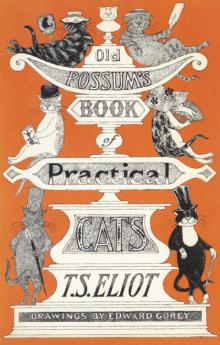 Old Possum's Book of Practical Cats
Old Possum's Book of Practical Cats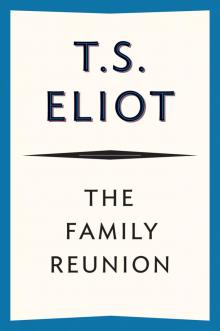 The Family Reunion
The Family Reunion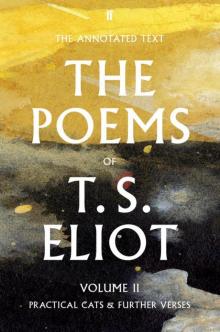 T. S. Eliot the Poems, Volume 2
T. S. Eliot the Poems, Volume 2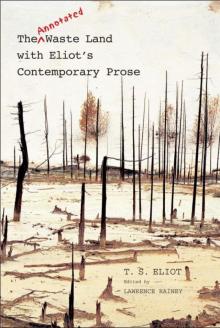 The Waste Land
The Waste Land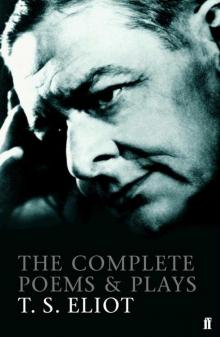 The Complete Poems and Plays, 1909-1950
The Complete Poems and Plays, 1909-1950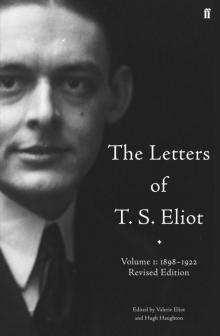 Letters of T.S. Eliot: 1898-1922
Letters of T.S. Eliot: 1898-1922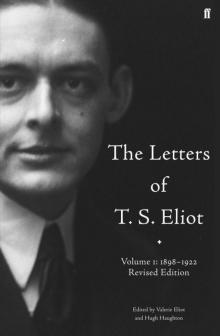 The Letters of T. S. Eliot, Volume 1: 1898-1922
The Letters of T. S. Eliot, Volume 1: 1898-1922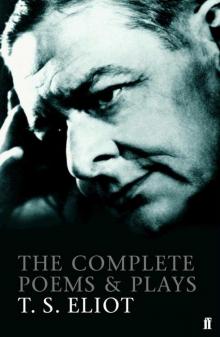 Complete Poems and Plays
Complete Poems and Plays